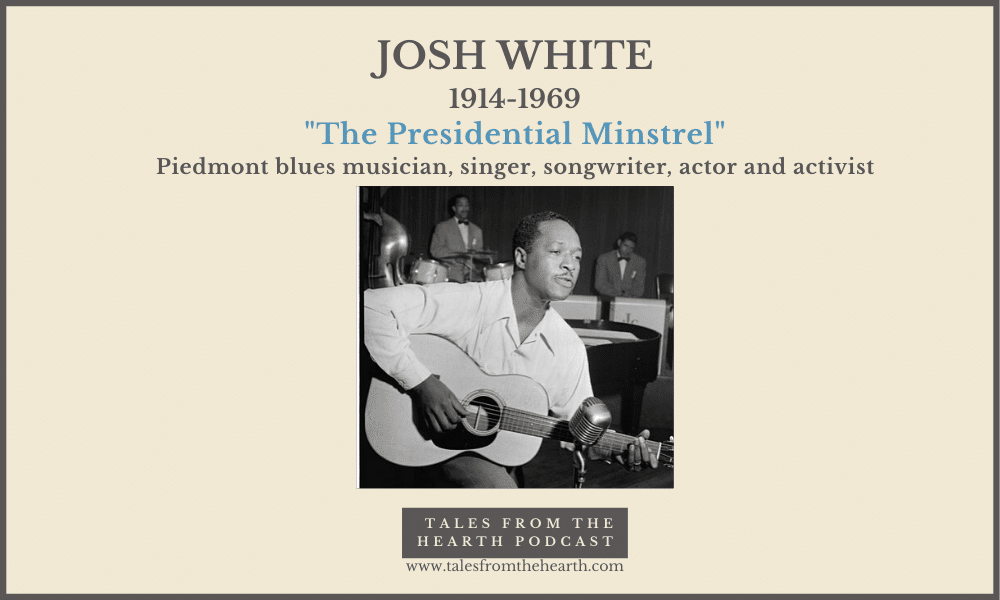Josh White
Did you hear about an African American folk musician who was invited to play in multiple presidential inaugurations in a time when this was considered unacceptable? How about a man who influenced many generations through his blues and folk songs? Join us for today’s episode on the remarkable feats of South Carolinian Josh White.
Let’s get cracklin’, shall we?
**********
Perhaps no one has influenced folk, gospel, and social justice music so greatly, yet had his legacy clouded as deeply in obscurity as Josh White.
In 1963, Josh White ranked third of all folk singers in a Billboard Magazine popularity poll. For reference, Bob Dylan ranked fourth.
He is said to have influenced greats such as Pete Seeger; Elvis Presley; Shel Silverstein; Bob Dylan; Peter, Paul and Mary; Don McLean; and John Fogerty—just to name a few. He broke down barriers and opened doors for other African American artists.
Josh White rode the wave of fame with its highs and lows throughout his storied career. He landed his first recording at age fourteen. He often performed with living legends such as Leadbelly, Pete Seeger, and Billie Holiday, and became personal friends with the Roosevelts (landing him the nickname “Presidential Minstrel”). In his time he was a pioneer, the only African American solo performer to tour nationally and to appear in mainstream Hollywood films and Broadway shows.
His stateside career suffered during the Red Scare of communism in the 1950s, but found success in Europe during this time—until a resurgence in popularity reopened opportunities in the U.S. in the ‘60s as folk music became more mainstream.
Josh performed and played hard, supporting African American causes and mentoring younger musicians such as Eartha Kitt, Sidney Poitier, and Harry Belafonte—just to name a few. In 1998 Josh White was featured on a U.S. post stamp, almost 3o years after his death.
Some of Josh White’s most popular songs are “Uncle Sam Says,” “The House of the Rising Sun,” “Cotton Eyed Joe,” “One Meat Ball,” “John Henry,” “The Riddle Song,” “Strange Fruit,” “Waltzing Matilda,” “Greenville Sheik,” and “Joshua Fit the Battle of Jericho.”
Sources for today’s story are: Many! As always, refer to the episode show notes at www.talesfromthehearth.com for links to all of the resources for today’s episode.
You can view many photos and links to information about Josh White on our Pinterest board located at https://www.pinterest.com/TalesfromtheHearth/josh-white/.
The primary resource for today’s episode is Josh White: Society Blues by Elijah Wald.
The One Takeaway I hope you get from this story is: Never give up! Push through every setback—big or small.
Now, I hope you enjoy the story about Josh White.
**********
Joshua Daniel White was born on February 11, 1914, in Greenville, South Carolina, the fourth of seven children (six living) to Daisy Elizabeth and Minister Dennis White.
Josh lived in a happy, yet strict, household. His father was a tailor and minister who forbade the children indulgences such as soda or rich foods. Secular entertainment or music were out of the question, but the Whites were a musical family, known for their gospel singing and entertaining the neighborhood with Christmas carols.
In 1921 Josh White’s father physically threw out a disrespectful white bill collector from his home, and retaliation occurred swiftly in the form of arrest and a severe beating. He was imprisoned and later sent to a mental institution, where he passed away in 1930.
With his father away—even though Josh was only seven or eight—he saw an opportunity to support the family by helping local blind musicians. Throughout the 1920s Josh toured the country getting paid to help various blind musicians; consequently, he could not attend school regularly and was beaten, forced to sleep outside, and made to wear rags and go barefoot to gain more sympathy and greater tips—which his employers promptly pocketed.
Josh claimed that he taught himself guitar when he was not working for the blind musicians. He became known for his singing and guitar playing on his own, achieving the feat of the youngest recorded soloist in “race music” at that time with the recording of “Scandalous and a Shame” at the age of fourteen. Soon after, he recorded an album with the Carver Boys band at a time when musical collaborations between blacks and whites were unheard of.
Josh earned enough money to return to his family home in Greenville, SC, to live “a normal teenage life,” but in 1929 the stock market crashed and the Great Depression followed. Around the same time, Josh broke his leg playing football. While recuperating, he was visited by a musical talent scout who urged Josh to go with him to New York City. Since Josh was a minor, his mother had the final say, and agreed that he could go—just so long as he played only gospel music.
Josh achieved success recording music as “The Singing Christian,” but his mother was disappointed to learn that he wasn’t just singing gospel music as she had requested. Her anger was temporarily appeased when Josh handed her $100—a large sum during the Great Depression.
Josh became very popular playing weekend parties for both blacks and whites, and was even featured in a Harlem fantasy all black radio show. In 1933 he met his future wife, Carol Carr, and was married Dec 23, 1934, in the Bronx. They would go on to have five children: Blondelle (also known as Bunny), Julianne (also known as Beverly), Josh Jr. (also known as Donny), Carolyn (also known as Fern), Judy, and a foster daughter, Delores.
He enjoyed the freedom and lack of racial stigma he experienced in the Harlem and East Coast music scenes, a luxury he did not experience in the South. While on a family visit to Greenville, SC, he got into a fight and hit a plainclothes policeman, landing himself in a crowded jail cell with three murderers. Fortunately, the murderers were fans of “The Singing Christian” and protected him from a severe jail beating.
Josh released his own gospel music under the name “Josh White,” but released blues music in 1934 as Pinewood Tom and later as Tippy Barton.
In 1936, Josh experienced a near career-ending accident. There are two versions of how it happened—I’ll let you choose which one you believe. The first version is that Josh was fighting another man over a woman, and punched through a glass door with his right fist. The second version is that Josh slipped on ice and slit the tendons in his right playing hand on a broken buttermilk bottle so badly that doctors thought they would need to remove two or three fingers.
Regardless of which story is correct, Josh received stitches—insisting that he not receive painkillers because he was worried they’d amputate his hand while he was knocked out. Josh left music for a time—taking on odd jobs such as longshoreman, elevator operator, bellhop, and building superintendent. He kept getting fired, however, and at some point re-injured his hand.
Things were tough until early 1940, when Josh played the part of musician Blind Lemon Jefferson in a production of John Henry, restarting his recording career and reestablishing his popularity with white audiences. He formed a group called The Carolinians with his younger brother, Bill, which became immensely popular and was signed by Columbia Records. Their record, Chain Gang, explored themes of racism and protest and was a critical and commercial hit.
Later that year, Josh was hired to work and appear with the Golden Gate Quartet on the radio show Back Where I Come From and The School of the Air, which catapulted his career throughout the United States. At the end of 1940, Josh and the Golden Gate Quartet played in Washington, DC, at a Library of Congress event to commemorate the 75th anniversary of the Emancipation Proclamation. Soon after, on January 19, 1941, Josh and the quartet played at Franklin Roosevelt’s third inaugural gala at Eleanor Roosevelt’s request, playing at the famed Constitution Hall—breaking all of the racial barriers and rules for the facility.
Less than a month later on Feb. 17, 1941, Josh and others were invited for a command performance at the White House for the president and first lady. This started a lifelong friendship between the Roosevelts and the White family. Josh’s brother, Bill, was hired to work in the Roosevelt home, and Eleanor Roosevelt became Josh Jr.’s godmother. After a second presidential command performance in 1941, Josh became known as the “Presidential Minstrel.”
Josh became more outspoken on civil rights, segregation, and social justice, recording songs and an album about these themes. He also became involved with the Communist Party because it was the only organization that truly welcomed African Americans in their social gatherings. This involvement would come back to haunt him—greatly.
During the war Josh became a popular entertainer, working in jazz clubs and cafes such as the famed Cafe Society in New York City. He sang patriotic wartime songs, but still spoke out against the way African Americans were treated. He was sometimes jumped outside of clubs or involved in fights because of his controversial lyrics.
So who was Josh White? From the one version of the story of how Josh damaged his right hand, you can deduce that he had at least one extramarital affair. During his life, there would be many affairs and many women. He oozed “cool” and sex appeal. He often performed in stylish suits, fancy silken opened-up shirts—completing the look with alligator shoes, a Lincoln car, and sporting a cigarette over his ear.
He was criticized throughout his career for playing too much to white audiences with his slick, smooth, and sexy entertainment acts. Many thought that made him too much of an “act” and not enough of an artist. It was also said that he suffered from ulcers due to excessive drinking, partying, womanizing, and the stress of dealing with segregation and Jim Crow.
He was known for being careless with money, but generous with others. As you recall, he was mistreated as a child when helping blind singers, so he would often see a disadvantaged child on the street and buy him or her new shoes. He frequently picked up tabs for others in bars and restaurants. On one occasion, he bought watermelons for his entire neighborhood to enjoy during the hot summer—a first for many children. Josh was always looking for ways to support African American artists and causes.
In February of 1942, Josh White began one of the first interracial collaborations ever with controversial Broadway star and torch singer Libby Holman, who became Josh’s patroness. The partnership proved logistically difficult due to segregation and the fact that many organizations would not allow such interracial entertainment.
As World War II started winding down, Josh recorded prolifically and restarted a national tour with Libby Holman. This tour took the pair all the way to Hollywood, where Josh appeared in his first film, The Crimson Canary. The partnership soon cooled (due to constant rumors that the two were lovers instead of collaborators), but Josh’s own film and Broadway career began to take off.
It is believed that Josh was one of the first solo African American artists to embark on a national tour of the United States in 1945. He was also acting and singing regularly in plays and films, receiving recognition in 1948 for his role in the film The Walking Hills and getting featured in magazines such as Ebony.
In Summer 1950, Josh traveled to Europe with Eleanor Roosevelt as part of a goodwill tour. Josh was a hit, playing for many crowned royals and other political leaders. He became a runaway success, postponing his flight back to the United States to record multiple albums in Europe, as well as a program for the BBC.
As his popularity grew across the United States, his stance on civil rights and affiliations with communists became controversial. In Summer 1950 Josh was listed as a Communist-affiliated entertainer via the notorious Red Channels publication. Others on the list included Orson Welles, Langston Hughes, Lena Horne, and Gypsy Rose Lee (for reference, there were a whopping 151 entertainers featured on this list). Most of those featured did not see this as a major issue or concern, figuring that the hype would blow over soon.
Josh, however, saw this as a major issue and met with many officials to clear up his Communist affilliations, publishing his side of the story in Negro Digest and voluntarily appearing before the House Un-American Activities Committee (HUAC, for short).
Unfortunately, Josh’s early testimony to the House Un-American Activities Committee (HUAC) set the dangerous precedent that “people who found themselves on the list should have nothing to hide.” As you may know, the HUAC went on to subpoena more testimony from others, and the rest was a red stain on U.S. history.
Because of his knee-jerk reaction and cooperation with the HUAC, Josh was seen as a sellout—and even worse—a traitor to the entertainment industry. For many years he was never fully cleared by the HUAC either, so it seems that he couldn’t satisfy the two sides. Josh and other entertainers worked hard throughout the 1950s to ensure that they were not blacklisted, even though the process itself was a moving target with constantly changing rules and perceptions.
There is no doubt that Josh was denied many opportunities and paid events in the U.S., such as being featured on The Ed Sullivan Show or other mainstream Broadway shows or films. During this time, Josh found meaning in mentoring other entertainers such as fellow South Carolinian Eartha Kitt, Harry Belafonte, and Sidney Poitier.
Fortunately, Josh found an escape from the taint of Communism in the U.S. by achieving international fame in Europe throughout the 1950s. His shows regularly sold out, and he recorded often. He was still always popular with the ladies and engaged in multiple international love affairs. In 1959, he had a son with a long-term lover.
In 1953 his manager died suddenly, leaving a void that resulted in fewer bookings and less attention from his next manager. Money became yet again an issue with Josh. He pawned some of his belongings, and it is rumored that Eleanor Roosevelt herself cosigned a loan to help Josh. One of Eartha Kitt’s biographies tells a story of her being asked by Josh’s manager to provide money to support him (she gladly obliged, but later felt swindled).
Some of Josh’s European and U.S. engagements were threatened due to Josh’s poor health. He underwent an operation on his leg and suffered from ulcers, bleeding fingers from psoriasis, and migraines. Many believed Josh should rest more and slow down his hectic tour and recording schedule. Josh never seemed to quit, though. He pushed through every setback—big or small—and kept traveling and showing up to perform anywhere and everywhere as though he didn’t have a care in the world. He never lost his sexy “cool” appeal.
In the 1960s, Josh saw a resurgence in popularity due to the revived folk movement, and the White Family was invited to attend John F. Kennedy’s inauguration on January 20, 1961. Josh appeared on television later that year on the show, Dinner with the President, presented by JFK himself.
Also in 1961, Josh had a heart attack and spent six weeks in the hospital, where he always kept his guitar nearby and was very popular with other patients and staff. Soon after, he was back on the road and performing at times with his children, whose careers had begun to take off a few years before as child actors, models, and performers.
On August 28, 1963, Josh played for his largest crowd ever for the March on Washington for Jobs and Freedom event, most known for the setting of Dr. Martin Luther King Jr.’s “I Have a Dream” speech.
In 1966, Josh worked with inventors on a fiberglass guitar prototype called the Ovation. By this time, Josh’s fingernails were bleeding so badly that it hurt him to play, so the inventors also built special resin and fiberglass fingernails for him. The major issue they had was how to reliably attach the fingernails to Josh’s so he could play the guitar all night long. The company developed a special glue—later introduced to the world as the product we all commonly know (and use) called Super Glue.
Josh continued to tour, but his poor health continued to slow him down. On September 5, 1969, Josh White passed away during heart surgery. His funeral was so well attended in New York City that two city blocks were shut down to accommodate all the guests and the media. The police department insisted on escorting his body for burial, organizing a salute for Josh and his family on Triborough Bridge as a final farewell to this amazing musician.
***************
Now you have it! What are your thoughts on Josh White? Reach out and let me know—I’d love to hear your thoughts on today’s story.
That’s it for today! I hope you enjoyed today’s story about the remarkable career of musician Josh White.


